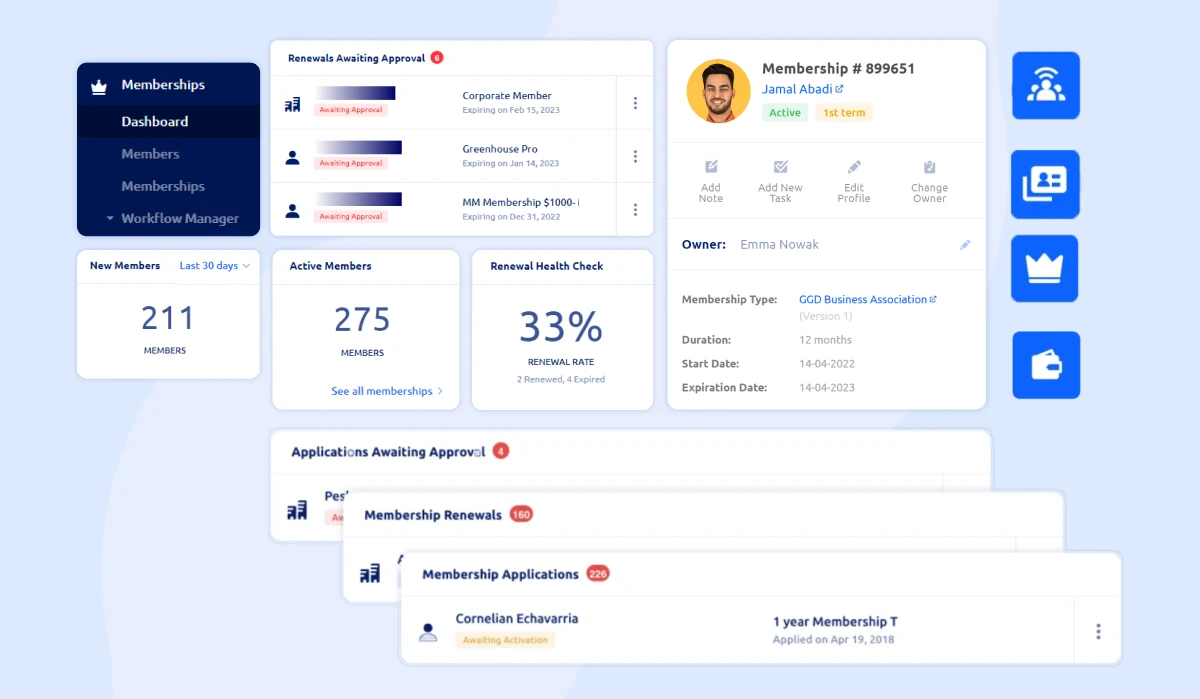
Association contract management involves the systematic process of creating, negotiating, executing, and monitoring contracts entered into by an association. Management typically oversees all agreements between the association and other parties efficiently and effectively.
Therefore, this blog comprehensively covers every dimension of association contract management. It provides insights into best practices for drafting contracts that safeguard the interests of all parties involved.
Even if you're new to managing contracts for associations or seeking to refine your current practices, this blog is designed to equip you with practical tools and expertise.
Key Takeaways
- Effective contract management is crucial for associations. It reduces risks, improves efficiency, builds stronger relationships, and ensures compliance, and inefficient management can lead to significant losses.
- The process involves four key stages: Development and Approval, Execution and Storage, Monitoring and Management, and Completion and Renewal.
- Associations typically deal with various contracts, including Membership Agreements, Volunteer Agreements, and Event Contracts. These contracts establish expectations, clarify roles, and mitigate risks for all parties involved.
- Use a centralized repository for contract storage, standardize contract templates, automate tasks to save time and costs, define clear roles and responsibilities, and provide training to staff involved in contract management.
- Glue Up offers comprehensive tools for association contract management, including AI Copilot for drafting contracts, secure document storage, digital signatures, automation, customizable templates, tracking and reporting, integration with other tools, robust security, and a user-friendly interface.
Why is Contract Management Important for Associations?

Contracts are the lifeblood of any association's operations. Research indicates that 40 percent of a contract’s value can be lost due to inefficient contract management processes, marking the importance of robust contract management practices within associations.
Contracts govern relationships with vendors, partners, sponsors, and even members in some cases. Effective contract management confirms that these agreements are clear, followed, and ultimately beneficial for the association. Here's why contract management is important for associations:
- Reduced Risk: Effective contract management reduces exposure to financial and legal issues that could arise from poorly managed contracts. It not only identifies potential risks early but also implements strategies to avoid them, safeguarding the association's financial stability and legal standing.
- Improved Efficiency: It streamlines contract processes, saving staff time and resources. Automating routine tasks and centralizing contract information allows staff to focus on strategic initiatives and decision-making, improving overall operational efficiency.
- Stronger Relationships: Contract management builds trust and transparency with vendors and partners, leading to more successful collaborations. Clear and effective communication, consistent contract performance evaluations, and proactive issue resolution contribute to building long-term, mutually beneficial relationships.
- Compliance: It ensures adherence to relevant regulations and best practices. Robust contract management practices include regular audits, documentation of compliance activities, and proactive updates to policies and procedures, ensuring the association operates within legal boundaries and industry standards.
Association Contract Management Process
To verify these contracts are managed efficiently and effectively, a well-defined contract management process is essential. Association contract management processes, though straightforward, require careful handling. This process is divided into four key stages. Let's explore what each of these stages involves:
1. Development and Approval
Standardized contract templates for common agreements save time and resources by providing a structured framework that reduces the need for repetitive drafting. Involving legal and finance departments early ensures thorough review and approval of terms, which is essential for mitigating risks and certifying compliance.
Surprisingly, only 25% of organizations have pre-approved fallback terms in place, highlighting the need for proactive contract management strategies to address potential challenges and uncertainties in advance.
2. Execution and Storage
Once finalized, contracts require authorized signatures from both parties. Secure storage in a centralized electronic repository marks easy access and retrieval whenever needed, thereby safeguarding critical agreements.
However, the statistics reveal concerning gaps: 49% indicate they lack a defined process for storing contracts after execution, leaving documents vulnerable to loss or unauthorized access. Moreover, only 22% report systematically tracking contractual obligations, risking missed deadlines or overlooked commitments.
Effective execution and secure storage are useful not only for legal compliance but also for maintaining organizational integrity and operational efficiency.
3. Monitoring and Management
Staying on top of key dates like renewal deadlines and performance milestones is crucial to guarantee that contracts remain effective and beneficial for all parties involved. This stage also involves monitoring compliance with agreed-upon terms to prevent any potential breaches and managing any amendments that may arise during the contract period.
Effective monitoring allows organizations to proactively address issues and maintain strong relationships with vendors, partners, and other stakeholders. It helps promptly identify and resolve discrepancies or deviations from the contract terms, thereby reducing risks and boosting operational efficiency.
4. Completion and Renewal
Performance should be reviewed prior to contract completion to determine if the agreement has met expectations. If necessary, new terms can be negotiated for contract renewal. This ensures the association continues to receive the best value from its partnerships.
Best Practices for Association Contract Management

If you have to manage association contract management, not doing it in the best possible way may not yield the best possible results. Here are some best practices for associations:
Centralized Repository
“One strategy used by leading organizations is to create a centralized function to manage contracts,” said Thorkildsen. So, if you aim to be a leading organization, utilize a secure, cloud-based system to store all contracts electronically for easy access and retrieval.
Standardization
Developing standard contract templates for common agreements is essential to saving time and ensuring consistency across all contracts. The predefined terms and conditions allow associations to expedite contract negotiations and approvals, allowing them to focus more on strategic initiatives and less on repetitive administrative tasks.
Automation
Businesses lose $122 for every hour an in-house lawyer spends working on a contract. This highlights the significant cost implications of manual contract management processes. Automating tasks such as reminders, approvals, and obligation tracking through contract management software can result in substantial time and cost savings for associations.
Teamwork
Clearly define roles and responsibilities for contract development, negotiation, and management. Involve relevant departments (finance and legal) throughout the process to avoid any ambiguity. According to stats, there is clear confusion on roles.
Fifty-nine percent of legal departments believe they play a leading role in contracting. A similar share (56%) of contracting believe they, not legally, are responsible. Meanwhile, 39% of business development professionals believe they are in charge.
Training
Provide training to staff involved in the contracting process to ensure understanding of best practices.
What Are the Most Common Types of Contracts an Association Typically Enters Into

Membership Agreements
Membership agreements form the foundation of the relationship between an association and its members. These unique contracts clearly outline the rights and obligations of both parties. As Warren Buffet rightly said, “It is impossible to unsign a contract, so do all your thinking before you sign.”
Hence, a well-defined membership agreement includes all the terms, conditions, and procedures, and moreover, it:
- Establishes Expectations: The agreement details membership benefits, dues structures, and any expected contributions (e.g., volunteering, participation in events).
- Promotes Fairness and Transparency: Clear terms validate a fair and transparent relationship between the association and its members. This includes outlining disciplinary procedures and termination clauses.
Having clear and consistent membership agreements in place is vital for professional associations.
Volunteer Agreements
Volunteers are the backbone of many associations, contributing valuable time and expertise. Formal volunteer agreements offer several benefits:
- Clarify Expectations: These agreements clearly define the scope of volunteer work, time commitments, and any required training. This helps manage expectations and ensures a smooth working relationship.
- Protect All Parties: Volunteer agreements can outline limitations of liability, protecting both the association and the volunteer in case of accidents or unforeseen circumstances.
Formal volunteer agreements demonstrate the association's professionalism and appreciation for its volunteer workforce.
Event Contracts
Events are a cornerstone of many associations’ activities. When collaborating with vendors, venues, and service providers for events, careful attention should be paid to contract details. A well-crafted event contract:
- Mitigates Risk: The agreement should cover all aspects of the event, including cancellation clauses, insurance requirements, and provisions for unexpected situations. This helps mitigate potential risks and financial losses.
- Ensures Clarity: Detailed descriptions of services provided, timelines, and payment schedules ensure clear communication and avoid misunderstandings between the association and its event partners.
Effortless Association Contract Management: Powered by Glue Up

Effective association contract management requires the right tools and technology. Automation software or an association management system (AMS) can be a game-changer, streamlining processes and minimizing risks.
Glue Up's AI-powered, all-in-one AMS is here to help! It not only manages your association's contracts but also offers a comprehensive suite of tools to empower you in every aspect of running your organization.
Let's find out how Glue Up can revolutionize your association's operations:
Document Storage and Management
Store all contracts and important documents in one secure, centralized location. Easily access and retrieve documents as needed.
Contract Management with AI Copilot
Glue Up AI Copilot helps you write the perfect contract terms and agreements, guaranteeing precision and compliance. Leveraging advanced generative AI technology streamlines the drafting process, saving time and reducing errors.
According to statistics, 44% of legal teams use generative AI for contracts, either daily or weekly, highlighting the growing reliance on AI to enhance efficiency and accuracy in legal work.
Automation
Automate reminders to ensure timely renewals and avoid lapses. Set up automated workflows for contract approval processes.
Customizable Templates
Create and use customizable contract templates to ensure consistency and save time. Easily modify templates to suit different types of agreements.
Tracking and Reporting
Track contract statuses, important dates, and milestones. Generate reports on contract metrics for better management and oversight.
Integration with Other Tools
Seamlessly integrate with other tools and platforms to enhance management capabilities.
Security
Ensure data security and compliance with robust security features.
User-Friendly Interface
Simplify contract management processes with an intuitive and user-friendly interface.
Many associations are utilizing Glue Up to streamline their operations and contract management. Glue Up is a software solution designed to centralize and manage various aspects of running an association. If you're interested in exploring Glue Up further, you can book a demo to see if it meets your association's specific needs.



